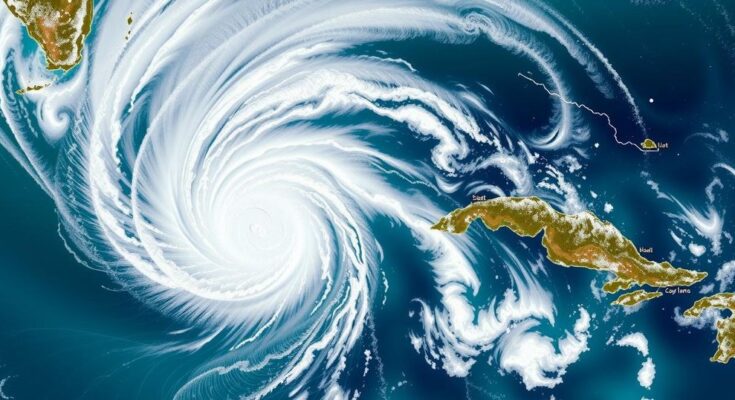Cyclone Chido, which struck Mayotte, was intensified by climate change according to Imperial College London. This cyclone represented the worst destruction in the region in 90 years and was categorized as a Category 4 storm. The study suggests that the likelihood of similar cyclones has increased by 40 percent due to global warming, highlighting the connection between climate change and the severity of tropical storms.
Recent research from Imperial College London indicates that climate change significantly intensified Cyclone Chido, which struck the Indian Ocean archipelago of Mayotte on December 14. This cyclone was the most destructive event for the region in nearly a century, categorized as a Category 4 storm, indicating its severe impact on a population already living in vulnerable conditions. Furthermore, the study suggests that cyclones of Chido’s magnitude are now 40 percent likelier to occur in the current climate than in pre-industrial times.
The direct effects of Cyclone Chido were devastating, with widespread destruction of inadequate housing throughout Mayotte, raising concerns about a potentially high death toll. By employing advanced computer models to simulate tropical cyclones, scientists were able to analyze changes in wind patterns and intensities associated with climate change. They discovered that wind speeds near Chido’s landfall location increased by 4.8 km per second when compared to prior pre-industrial climate conditions. Consequently, the study elucidates how climate change escalated Chido’s classification from a Category 3 to a Category 4 cyclone.
Although the French meteorological service did not definitively link Chido’s severity to climate change, it acknowledged that human activities leading to warmer ocean temperatures have resulted in more aggressive storm patterns. The increased warmth of the climate—approximately 1.3 degrees Celsius above pre-industrial levels—has important implications for these natural disasters, contributing to more erratic weather phenomena as warmer air and oceans amplify condensation and evaporation processes underpinning tropical storm formation.
The ongoing challenge of climate change has been a significant concern for scientists as its implications span numerous aspects of environmental phenomena, including the severity and frequency of tropical storms. Cyclones, particularly in vulnerable regions such as Mayotte, have been increasingly scrutinized due to their potential amplification from global warming. Studies have established a correlation between elevated sea surface temperatures and intensified cyclones, as warmer oceans provide more energy for storm formation. The recent case of Cyclone Chido exemplifies the intersection of climate dynamics and natural disaster impact, urging researchers and global communities to acknowledge and address the influence of climate change on cyclone behavior.
The findings from Imperial College London regarding Cyclone Chido underline the urgent need for further investigation into the effects of climate change on severe weather patterns. With cyclones becoming increasingly volatile as the climate continues to warm, understanding these dynamics is crucial for future research and disaster preparedness. The impact of such storms on vulnerable populations necessitates a concerted response to mitigate risks associated with climate-induced phenomena, emphasizing the importance of ongoing climate action and resilience planning.
Original Source: www.straitstimes.com




